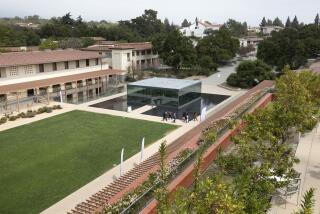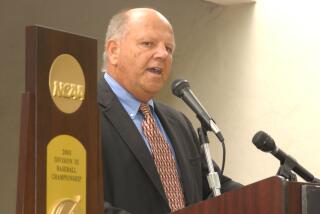11th Chapman President Lists Bold Agenda at Inauguration
ORANGE — Amid pomp unique to academe, Allen E. Koenig formally became Chapman College’s 11th president Friday, vowing to embark on a bold agenda that includes creation of the school’s first doctoral programs and full-fledged university status by 1992.
Koenig told those assembled in the private Christian college’s auditorium that he hopes in the 1990s to establish a new school of communication arts, as well as centers for the study of ethics and international studies.
He hailed a pioneering consortium agreement, announced simultaneously Friday at the United Nations in New York, that will link Chapman and three U.S. universities to five Eastern European universities in a unique exchange of information, faculty, and perhaps eventually students.
Koenig said he would also invite the World Affairs Council of Orange County to settle on the Orange campus and promised to seek wider audience for the college’s choir and orchestra, products of a music department he called “the best kept secret in Orange County.”
“My vision goes far beyond the cosmetics of a mere name change” to a university, said Koenig, clad in a purple robe and black velvet Elizabethan-style mortar board that harked back to the cloistered world of medieval academia.
“A university should be defined by programs and a structure that truly reflects academic excellence . . . and a complex, yet effective organization.”
Friday’s ceremony--replete with a procession of robed, capped professors, a sweet-voiced choir singing hymns set to Beethoven and a benediction from Roman Catholic Bishop Norman F. McFarland of the Diocese of Orange--was the ritual acknowledgement of a presidency that began Oct. 1, 1989.
Established in 1861 by the Christian Church (Disciples of Christ), Chapman College had been without a president since the retirement of former president G.T. (Buck) Smith in May, 1988.
Koenig, a controversial pro-growth president of Emerson College in Boston, came to the Orange campus as a finalist candidate last fall with plans to turn the 2,200-student liberal arts college into a “medium-sized university.”
That immediately raised the hackles of nearby residents of Orange’s historic Old Towne neighborhood. They had battled Chapman administrators in recent years over plans to construct high-rise buildings on the campus that they argued would be out of step with the prevailing turn-of-the-century Southern California architecture.
On Friday, Koenig chose his words carefully when asked about expansion.
“In the next three years, I’d be glad if we get 300 more students,” he said. “Perhaps it might take us 10 years to get to 3,500 students.”
Koenig gave special praise to the psychology and education departments and proposed expanding both into doctoral programs.
“I believe the psychology program can be an important step in our continuing evolution toward university status,” he said. “(And) considering the teacher shortages forecast for the years ahead, we should move in further distinguishing Chapman as a center for graduate study in education.”
At the same time, he called for strengthening existing programs throughout the institution as Chapman poises itself for “leadership” in Orange County, the state and the western region.
“There must never be even the slightest perception that Chapman is anything but a unified, cohesive institution of higher learning,” he said.
More to Read
Sign up for Essential California
The most important California stories and recommendations in your inbox every morning.
You may occasionally receive promotional content from the Los Angeles Times.










